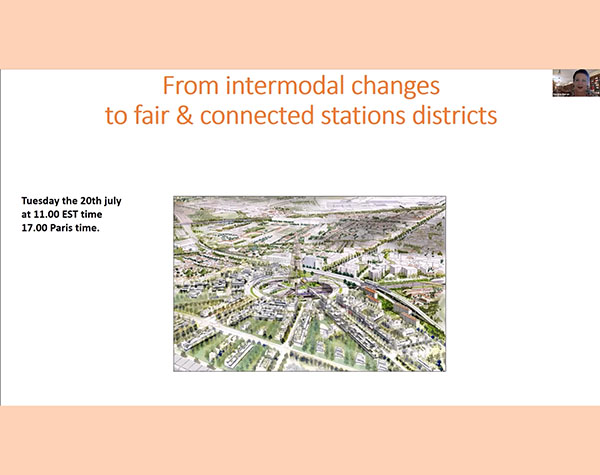Replay | FAID Cities of Tomorrow
30 septembre 2021
On July 20th, 2021, the Office for Science & Technology of the Embassy of France in the United States organized the fourth session of its webinar dedicated to innovation: FAID - Cities of Tomorrow: "Developing Fair and Connected Stations Districts".
Initiated in Boston in 2001, the French American Innovation Days (FAID) bring together French and American experts on a specific topic in the field of current innovation.
In September 2020, the Office for Science and Technology launched a series of webinars on the future of cities. The objective for this series of events is to open a dialogue between academics in France and in the US on the importance of security and trust in the digital age, and in particular for designing the cities of tomorrow.
Fourth session of the series, "Developing Fair and Connected Stations Districts" has been organized by Nacima Baron (professor at the Ecole d’Urbanisme de Paris, member of the research unit LVMT - Laboratoire Ville Mobilité Transport) and Isabelle Gournay (former professor at the University of Maryland). Nacima Baron and Isabelle Gournay have invited Alain l’Hostis (Université Gustave Eiffel) and Gerrit Knaap (from the National Center for Smart Growth of the University of Maryland).
The four parts of this discussion were:
1. Paris and Washington: Two capital cities mutually learning from their experiments conducted in the development of transport infrastructures.
2. E-scooters: A new means of transport with promising intermodal perspective?
3. The Purple Line Corridor Coalition (PLCC): Towards a sustainable and equitable transit corridor.
4. Putting the public value, the community building and the user experience at the heart of the urban planning.
To watch the discussion in full-length on the Youtube channel of French Science in the USA (in English):
→ https://youtu.be/wvQc9Gb_2e0
To read the transcript of the discussion (in French):
→ https://france-science.com/faid-villes-de-demain-webinaire-3-2-vers-des-quartiers-de-gare-mieux-connectes-et-plus-equitables/ [Archive]
Le 20 juillet 2021, le Service pour la Science et la Technologie (SST) de l’Ambassade de France aux États-Unis a proposé le 4e opus de son cycle de webinaire FAID - Villes de demain/Cities of Tomorrow : "Vers des quartiers de gare mieux connectés et plus équitables"/ "Developing Fair and Connected Stations Districts".
Initiés à Boston en 2001 et tournés vers la Recherche & Développement, les French American Innovation Days (FAID) invitent à chaque session expert.es français.es et américain.es à venir discuter et débattre d'une thématique, en lien avec l'actualité de l'innovation.
En septembre 2020, la Mission pour la Science et la Technologie a ainsi lancé une série de séminaires en ligne, visant à explorer des pistes de coopérations franco-américaines sur l’importance de la sécurité et de la confiance dans le numérique pour le futur des villes.
Le 4e opus de ce cycle, "Vers des quartiers de gare mieux connectés et plus équitables", a été organisé avec Nacima Baron (professeure à l’École d’Urbanisme de Paris, chercheuse au LVMT - Laboratoire Ville Mobilité Transport) et Isabelle Gournay (professeure émérite de l’University of Maryland). Nacima Baron et Isabelle Gournay ont invité Alain l’Hostis (Université Gustave Eiffel) et Gerrit Knaap (National Center for Smart Growth Initiative - Université du Maryland).
Au sommaire de cette session axée sur les défis associés à la construction d’infrastructures de transport et au développement des quartiers entourant les stations et gares :
1. Paris et Washington : deux capitales qui apprennent mutuellement de leurs expériences dans le développement d’infrastructures de transport
2. Les trottinettes électriques : un nouveau moyen de transport prometteur pour l’intermodalité ?
3. La Purple Line Corridor Coalition (PLCC) : un exemple unique d’organisation ayant pour objectif de développer des couloirs de transit plus durables et plus équitables
4. Placer le bien public au cœur de l’aménagement urbain et l’importance du partage d’expériences
Pour revoir l'intégralité de cette rencontre sur la chaîne Youtube de French Science in the USA (en anglais) :
→ https://youtu.be/wvQc9Gb_2e0
Pour lire le compte-rendu intégral de cette rencontre (en français) :
→ https://france-science.com/faid-villes-de-demain-webinaire-3-2-vers-des-quartiers-de-gare-mieux-connectes-et-plus-equitables/ [Archive]
